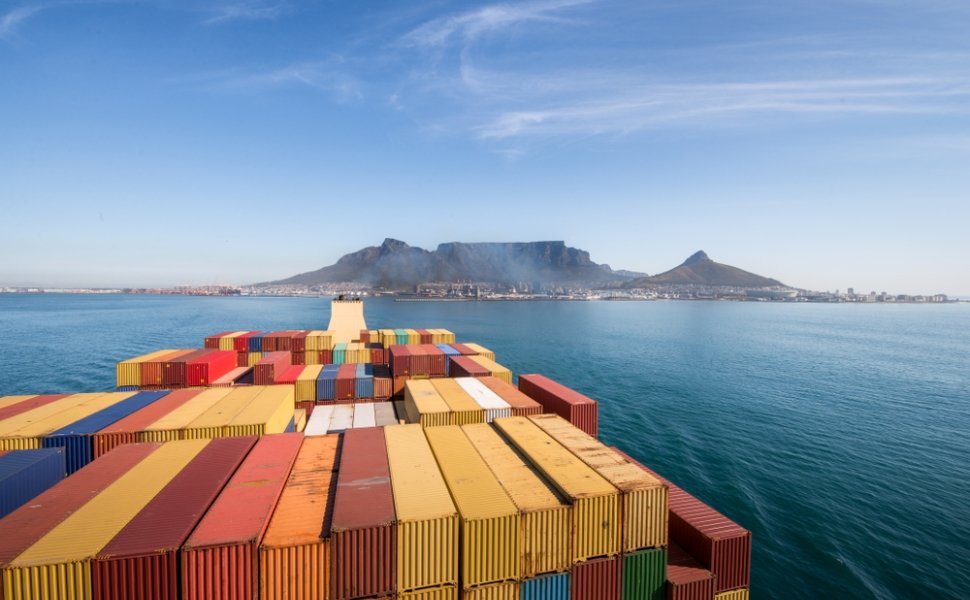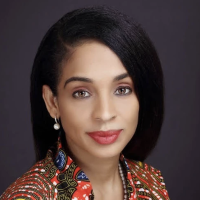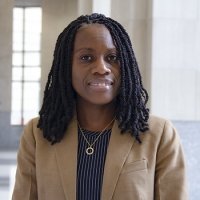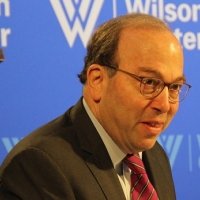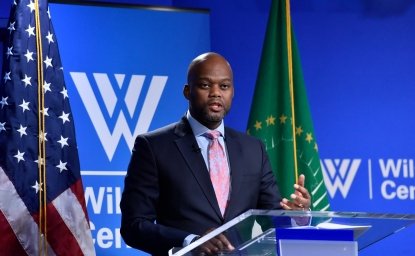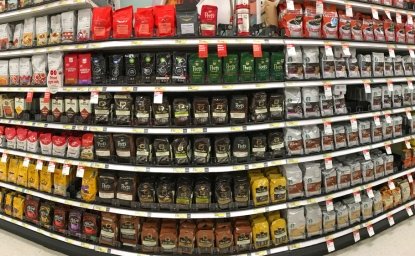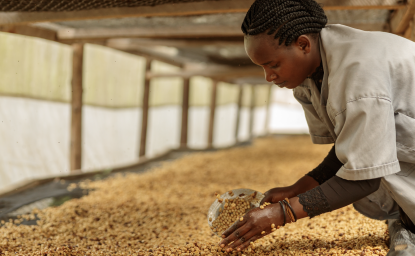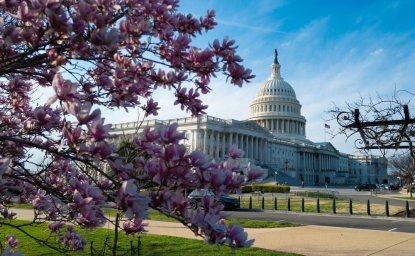This transcript has been lightly edited for length and clarity.
Oge Onubogu: Ndidi, it is such a pleasure to have you on the show today. Welcome.
Ndidi Okonkwo Nwuneli: Thank you so much, Oge. It's really an honor and privilege.
Oge Onubogu: We're going to dive right into the conversation. So you have, you know, you worked in civil [00:02:00] society, you have run your own small business, you're a serial entrepreneur, you understand the nexus between, you know, human rights and civil society.
And I would love to hear more about your experience, um, with civil society, particularly working in the US Africa context as a person. regards to, to AGOA?
Ndidi Okonkwo Nwuneli: Well, first of all, I have to say that AGOA, um, is a very, very important policy tool for Africa US relations and as an entrepreneur sitting in Nigeria, you know, 20 years ago we were so excited when AGOA was launched and there was so much momentum around, you know, galvanizing entrepreneurs in textiles and food and many, many sectors is to really tap into the AGOA opportunities to create jobs, improve livelihoods, and cement the relationship between many countries in Africa and the United States. And so as we reflect on, [00:03:00] on the AGOA, um, promise, I would say that, you know, civil society While I'm optimistic about the future, I would say a lot of people feel like we haven't really fully maximized the potential that AGOA could generate.
And so, from my lens, there are a number of roles that civil society has to play in the AGOA story. Um, number one is, you know, really ensuring that more entrepreneurs across Africa know about AGOA. I think when we look at the number of, uh, countries and businesses that have benefited from AGOA, there are, you know, lots of success stories, but also lots of opportunities for improvement and more leverage.
Um, so that's one. The second is as you think about, you know, the data, um, and holding countries accountable at all, on all sides to ensure, you know, job creation and value addition. [00:04:00] And knowledge transfer and the growth prospects. Obviously, civil society has an important role to play. And then really importantly, the human rights angle.
We always believe that businesses should do well and do good. Countries should protect and empower their people. And as as companies and countries are positioned to leverage On the benefits and the promise of AGOA, you know, really keeping in mind the human rights dimensions And I start at the very basic concept of workers rights and and fair wages and livable salaries all the way to transparency and accountability and traceability and you know to some of the more stickier issues around human rights and how we're defining You know a level playing field Um, an inclusive growth.
And so all of that is part of civil society's remit and the role that civil society plays in their AGOA story. [00:05:00]
Witney Schneidman: Ndidi, so what do you think the track record is over nearly 25 years of AGOA being a stimulus to civil society and enhancing the governance equation in Africa? Is it a good story? Is it an unfinished story?
Is it something that needs to be doubled down on, or is it a part of the story that maybe doesn't go with trade. There's some who argue that, um, you know, when countries get kicked out of AGOA, it's, it's, it's workers. And in fact, civil society folks who, who, um, are, are, are hurt by that, but just curious.
Ndidi Okonkwo Nwuneli: Well, I would say it's an unfinished story. When you look at the numbers, you know, 300, 000 jobs created in African countries, that's very promising. And that's positive. When you look at the products, you know, that have move from Africa to the US market, [00:06:00] 1, 800 products, but most of them in the energy and crude oil sector, you know, a few in motor vehicles.
So on face value, when you look at the, you know, the diversity of products and the number of jobs created, you know, it looks on face value promising. But when you look at the absolute numbers, I have to say that it's an unfinished story. Um, I think 10 billion per year since 2014. And from, you know, a business lens and I, I'm at the, at my heart, a business woman, an entrepreneur, um, that number is quite small, right?
Uh, relative to, you know, other countries. And if you just say, of course, US-Mexico, I'm just using US-Mexico, I think it might be 10 billion a day. Um, so my, or even US Bangladesh or US you know, name the country. And so from where I sit, it's it's unfinished because while [00:07:00] the growth prospects are immense and the synergies between our country continents are, you know, North America and Africa are amazing.
We haven't really maximized them. So I would say the numbers. Say, well, we've just started the journey. I would like to see 100 X growth. Now, when you now just oppose the human rights dimension, I think the data doesn't tell us a full story. of how those 300 jobs have changed lives on the ground. And then how the instruments around, you know, transparency, accountability, the rule of law, um, level playing field, um, how they really pan out on the ground.
Um, and I think for me, that would be quite important because if we layer on some of the carrot and stick. approaches, there's some complexity around that double standard. Um, recently I was at the Africa Qatar summit in [00:08:00] Morocco and a young lady came up to me and, you know, she has a textile company in Rwanda.
Um, and you know, really told me about the challenges that her company has faced, um, because they cannot benefit from AGOA. Um, and how, you know, they've had to reduce the number of employees they have and the impact it has had on the women who work in her organization. She makes textiles. But it was so important to hear her story because she has been prevented from accessing Angola because of the country she sits in.
She's now thinking, should I move to another country? Right. Should I establish a presence in West Africa? Um, and so for me, that complexity, um, And that nuance doesn't also tell the story of the ramifications of sanctions or changes in policy on the countries that we choose not to buy from. Um, and so I would love to see a lot more data on that.
I always call it the unintended [00:09:00] consequences of policy decisions and the medium and longer term consequences. And in her case, I would love to follow her story to see how we hold her hand. To benefit from AGOA, um, and to really maximize the impact of AGOA.
Witney Schneidman: You know, you just said one thing that I think a lot of people resonate with when you said you'd like to see a hundred X growth, what should be done to get that?
How do we achieve that?
Ndidi Okonkwo Nwuneli: So I think there are a number of things we have to do. Number one, we have to change narratives about Africa. We have to change narratives. We have to believe that we can source the highest quality products from the African continent that can compete with other world regions. And to achieve that narrative shift is not only telling positive stories, but also elevating the quality of the products coming from the continent, knowledge transfer, skills, building technology, transfer, um, improving the efficiency and effectiveness of our businesses and enabling and [00:10:00] supporting scaling.
Um, that's huge, right? The other one is catalytic financing. And that's why when we come with AGOA, we also have to come with financial instruments. That's why I'm excited about Prosper Africa and a lot of the work that the team has been doing. The promise of the DFC and unlocking that the promise of us XM and unlocking that I'm not working in silos, but But actually bringing the might of US financial and catalytic financing to support and go and to support the scaling of SMEs is critical. And then the third piece, I would say, is really ensuring that we transfer, um, what I would say best practices in terms of human relationships and, uh, the level playing field. And we've seen how, you know, US governments have worked alongside Governments and I use Bangladesh. I use Mexico. I use trading partners that the US has established such a cordial relationship with Brazil, and it's around also elevating Institution [00:11:00] building in terms of law, in terms of standards of operating excellence, in terms of, you know, transparency and accountability at the highest levels.
And you work alongside partners, because we know that economic growth leads to stronger institutions and vice versa. It's not a chicken and egg, which one comes first. And I would love to see that third piece also critical to the work we do at one.
Oge Onubogu: I want to pick up on a point you made about AGOA being an unfinished story, and just going back to the theme of this podcast for us, being able to bring different perspectives, different narratives to help inform the broader part, uh, the broader community about what the impact of AGOA is.
But hearing about it from different from different angles. I think that's really, really helpful. Now, to the point about this being an unfinished story from where you sit at the one campaign and just given the work that you've done with civil society over time, what role do you think civil society can constructively play in this [00:12:00] moment towards ensuring, um, that we move towards not Only a renewal of a AGOA, but building an AGOA that is, um, more reflective of the times that we're in today in US Africa relations.
Ndidi Okonkwo Nwuneli: Yeah, so renewing AGOA is not just about trade. It's about empowering growth, deepening trust, and unlocking the full potential of US Africa partnership. And that's why AGOA is so important to one, but it's also really important to civil society more broadly because civil society wants to see growth and economic Justice in many of our countries.
And so the first part I would say, and I want to underscore is the importance of data. I mean, civil society can can hold us accountable to not only develop the right data tracking tools. Elevating the results, but also calling out opportunities, and there's one data points that I want to share, which [00:13:00] I feel like civil society in the African continent would really be galvanized by, which is that nearly half of all AGOA countries had a utilization rate of 2 percent or less between 2010 and 2020, which means that 98 percent of US imports from these countries were subject to tariffs. Thank you For me, that is unacceptable, right? 2 percent utilization rate. And this is shows you that there's tremendous room for growth. And so data being made available, quality data to civil society, to raise awareness, to push for the dismantling of bottlenecks, to hold governments on both sides of the divide accountable, and to elevate the changes required is key. The second piece is really civil society banding together. And when I think of civil society, I think we need civil society in the U S working with civil society on the ground in Africa on our shared goals to, to really unlock the promise of AGOA. And that's really around the, the knowledge [00:14:00] transfer.
I've talked about the transparency and accountability. That is key. the, uh, raising standards of excellence in terms of what, um, good practices looks like in benchmarking what has worked in other regions and in transferring it. And then really building up the advocacy piece. And that's where one comes in.
One really believes that civil society has a role to play in advocacy in, in saying, this is what excellence looks like. This is what we demand. And this is what we're going to be holding. ourselves accountable. And for me, it's political leadership at the highest levels. And that's why we want a reauthorization of AGOA here in the US, but also it's political leadership in our countries in Africa saying, yeah, this is what we expect from US leadership in Africa and in the world when it comes to trade, when it comes to growth, when it comes to trust, and when it comes to true long term partnerships. And I think the role that civil society plays in advocating for That bridge building is critical, [00:15:00] um, but it's also holding governments accountable to do what they say and to fulfill the ends of the bargain on both sides of the divide.
Witney Schneidman: Ndidi, when Congress extended AGOA the last time in 2015, they asked AGOA beneficiary countries to develop national utilization strategies. In your experience, have civil society been involved in the development of, of these strategies and should they be involved?
Ndidi Okonkwo Nwuneli: I definitely think they should be involved.
Um, and that's the challenge is that in many of these countries, civil society is not at the table. We've seen that with many, many packs with many, many visioning exercises. Um, there's a lot of distrust between civil society and the public sector and the private sector. But I go up demands that. Civil society works with the private sector and the public sector to truly unlock this promise.
And so I would love to insist that civil society has a seat at the table in developing these compacts [00:16:00] and following through on the implementation of the roadmaps. Because yes, we need to achieve this 100x. We need civil society involved. We need private sector growing and leading. The charge because the job creation comes from the private sector.
We need the public sector to create the labeling environment for trade and for effective and inclusive growth for the most vulnerable in particular. And this is gender. This is youth. This is, you know, anyone who's left behind really saying, how do we ensure that the growth is inclusive? And as the trade, um, as we have the 100 X growth, we don't leave the most vulnerable behind.
Oge Onubogu: But can you share examples of where civil society and governments have been able to work together to move through initiatives that were beneficial for the entire society as we look towards the work on AGOA?
Ndidi Okonkwo Nwuneli: Yeah, so I, I first would like to define what civil society [00:17:00] is because I think oftentimes there's a mis, misperception.
And that is nonprofits, community based organizations, faith based organizations, community groups, whether registered or unregistered, and they are critical. And we work with them all the time on the African continent, right? Pharma associations are part of civil society, right? Non profits that new knowledge transfer are part of civil society.
And we have worked extensively with them in my life as an entrepreneur. I spent a lot of time in food and agriculture. I would love to see AGOA maximize the amazing food from the African continent. Now, how have we worked with pharma groups on, on, um, in food and ag to change policy? Number one, farmer groups are critical as part of the supply side of food and agriculture, right?
Ensuring that they have an enabling environment to work is critical. And working with farmer groups and civil society, we developed a very, very clear roadmap in our context. And I'll use one example for the [00:18:00] dairy sector in Nigeria. We brought them together through the Commercial Dairy Ranchers Association of Nigeria.
We defined a dairy strategy for the country. We got every single ministry of education, ministry of finance, central bank, ministry of agriculture, and ecosystem approach, um, and ensure that we streamline the policy agenda for the country to not only ensure that Nigeria can supply enough milk to feed its own people, but that we also address the trade rules associated with milk.
This case was a very localized case, but I can escalate it to civil farmers involved in ginger trade and turmeric trade. And cassava trade across the board, shaping not only the enabling environment to ensure they can scale, but also the trade rules to protect themselves and their own constituencies as governments determined, um, the policy environment for them to scale.
And we've seen that enable a lot of [00:19:00] progress right in the food and agricultural landscape. So I have had so There's no work you can do in food and agriculture without civil society who include the farmers, the NGOs and the associations.
Witney Schneidman: I'm wondering, just building what you said, your very powerful example of your experience working in the dairy sector with civil society.
What are you seeing today more broadly with civil society and the coalitions? Um, a non experience. Agoa example, you know, on the issue of Sudan, civil society used to be so outspoken, uh, and, and help, uh, have it designated as genocide under the Bush administration. We're, we're civil society today more broadly as it, uh, concerns Agoa and the renewal.
Ndidi Okonkwo Nwuneli: I think that's why I welcome this discussion that again, you are leading because unfortunately we haven't seen the [00:20:00] coalescing of civil society around, um, many of the issues that of our time, right? In the African continent. I think one of the reasons, frankly, on the ground is that our civil society has been weakened in a lot of our countries due to some of the setbacks.
Um, and I would prefer not to get into them, but some of us know, given some of the countries we sit in, that, um, it's become tougher, right? Tougher and tougher, um, to, to stand as a civil society organization. And that's why actually, believe that Africa wide civil society movements are critical, right?
Because otherwise, if you're just focused on a specific country and you're being targeted, it's tougher, right, to challenge the government. And so we at ONE are elevating our civil society voices to an Africa wide frame. Right. So that we're not limited to the challenges that we are confronted with in some of our countries.
And I'll say for me, they're exciting movements. Um, [00:21:00] and I'll use Africa, no filter as an example. We've been talking to them. I mentioned narrative shifts and, uh, they have brought together a few civil society organizations around this concept of the cost of negative stereotypes. on the African continent and quantified it at about 4.
2 billion just from the negative reporting from, uh, new processing of election results and the impact it has on credit ratings and financing costs, et cetera. And we're going to be building on that, uh, at one. But one of the things that I'm mentioning is that they brought together other civil society organizations and say, what can we do?
And where's the role of the press? Where is the role of the private sector? Where the, what's the role of other actors to start changing those narratives? And to me, that's an example where we're elevating these issues beyond one country. And we're saying, this is an Africa problem, stare at negative stereotypes.
What can we do across our countries to address it? And the same with trade. And I, I mean, with the Africa continental free trade [00:22:00] agreement, I'm elevating and working with civil society to say this is an opportunity for us not only to dismantle the bottlenecks for internal trade within our continent, but trade with other regions.
How can we work together? We're starting to see a lot more interest in Africa wide, um, and African Continental based advocacy as opposed to country specific. Not that it doesn't matter at the country level, but elevating these issues then strengthens you to take on countries as opposed to being kind of silenced.
And we're, we're seeing that silencing happen at the country level for some countries. Um, I also think it's exciting that we are hosting, uh, South Africa is hosting the G20. And at the one campaign, we've been, you know, working closely with AU and also with the, uh, many civil society partners in South Africa to say, how can we use this moment?
And how can we elevate the trade opportunities that this moment [00:23:00] presents? The narrative shift opportunities. the debt, uh, restructuring opportunities, et cetera, et cetera. So I think there's a coalescing of civil society and South Africa has been very smart to also give civil society a seat at the table for the G20 and to hear from them and to ensure that civil society is involved.
And that for me is very exciting and gives me a lot of hope. So while there is, uh, I wouldn't be able to agree some there's been some silencing, there's still there are glimmers of hope that we are taking full, um, uh, cognizance of and jumping on or any glimmer of hope to, to propel voices, amplify voices and to drive impact.
Oge Onubogu: Following up on that, when we look at African civil society organizations working together within the continent, you had mentioned earlier on the importance of African civil society organizations also working with US civil society organizations around issues like AGOA. Um, can you [00:24:00] provide sort of concrete examples or ideas on how, you know, civil society organizations on the continent and in the US can seize this moment to ensure that we're moving forward to see an AGOA that is beneficial for all?
Ndidi Okonkwo Nwuneli: Yeah, so I'm starting to see some glimmers of hope with chambers of commerce, associations of entrepreneurs in the US working with associations of entrepreneurs in Africa. I believe those associations, nonprofits are part of civil society, right?
They're not part of private sector. We're starting to see those chambers come together. Those associations start raising, um, the data questions, the capacity building questions, the knowledge transfer questions. It's still early days, but we're starting to see some excitement there. We're also starting to see some interest there.
From diaspora organizations, um, not just diaspora organizations, um, in the US, but diaspora organizations all over saying how can we also, also, um, [00:25:00] uh, connect our, our, our trade routes more closely. And guess what? The Nigerian diaspora, for example, in the US or the Kenyan diaspora, the Zambian diaspora that are entrepreneurs themselves are going on these trade missions, right?
But their diaspora associations are following suit. And I'm so excited every time I, I see a trade. group come to the, to Africa. And I see Africans who now live in the US coming as part of those delegations. And I think we have to leverage those ties because diaspora groups understand the challenges, the opportunities, the narrative shift potential and our world position.
And we have very strong diaspora organizations emerging in the US for many, many of our countries. And many entrepreneurial diaspora groups are also taking advantage of this promise. And then the last thing I'll say is I really believe academic institutions have an important role to play on both sides of the divide.
We can't see the progress and value addition without the role of academic [00:26:00] institutions. Whether you call them civil society or not, I actually believe some of them that are nonprofit as civil society and have a role to play not only in terms of tracking, um, the data, but knowledge transfer, technology transfer, and skills transfer.
And I'm excited to see a lot more partnerships between US universities. and African universities. Um, and I would love to see more of that. And so for me, those are the glimmers of hope. Those are the groups that are starting to emerge and let's keep, let's keep watching the space to see what we can do together.
Oge Onubogu: I think for me, just one final question, just in terms of thoughts moving forward. We've been having conversations about AGOA's renewal, about modernization. You were also on a panel here at the Wilson Center, um, in July, our AGOA, uh, civil society and organized labor forum.
So this conversation has been ongoing for a while. Um, so moving in new administration, new thinking, what would be your [00:27:00] advice in terms of moving this conversation forward? What would you like to see, um, in, in the future? And one, you know, a piece of advice that you could put forward to the, to the new administration.
Ndidi Okonkwo Nwuneli: The first thing I would say is that AGOA makes business sense. It's a win win for both African countries and the US high quality goods and services being traded across countries creates jobs, creates growth, creates wealth. And for me, there's a return on investment. And I think the incoming administration understands the importance of return on investment for every US dollar spent. And I go as one opportunity for the US to demonstrate not only its partnership With African countries the trust it has but its commitment to growth and development That is mutually beneficial and sustainable And so I would like to see a hundred x growth for and with AGOA [00:28:00] and a diversification of the products that are coming from Africa to the US to ensure Not only value creation value added products that are high quality That also translate into inclusive growth and inclusive jobs and sustainable livelihoods. So I would ensure, I would push and challenge the incoming administration to embrace an AGOA plus plus. And I, when I say plus plus, I mean, a redesigned, bold, courageous AGOA with very clear targets that are ambitious from both sides, a clear mandate around knowledge transfer.
A holistic approach to catalytic financing to ensure growth because African governments and African private sector wants catalytic patient capital that drives growth and scaling directly linked to trade and a partnership with the trading mechanisms that are emerging. We have the AfriExim, we have the, uh, Continental Free Trade Agreement.
[00:29:00] There are entry points at the continental level and entry points at the country level. So, for me, It makes sense to partner with AGOA, to support AGOA, to elevate AGOA, to reauthorize AGOA for a multi year, but to also support the growth agenda and the scaling agenda so that we move from a promise of AGOA to a realization of the full potential of AGOA.
And I look forward to celebrating those successes, um, and seeing how this cements a greater, deeper, more trusting US Africa relationship.

